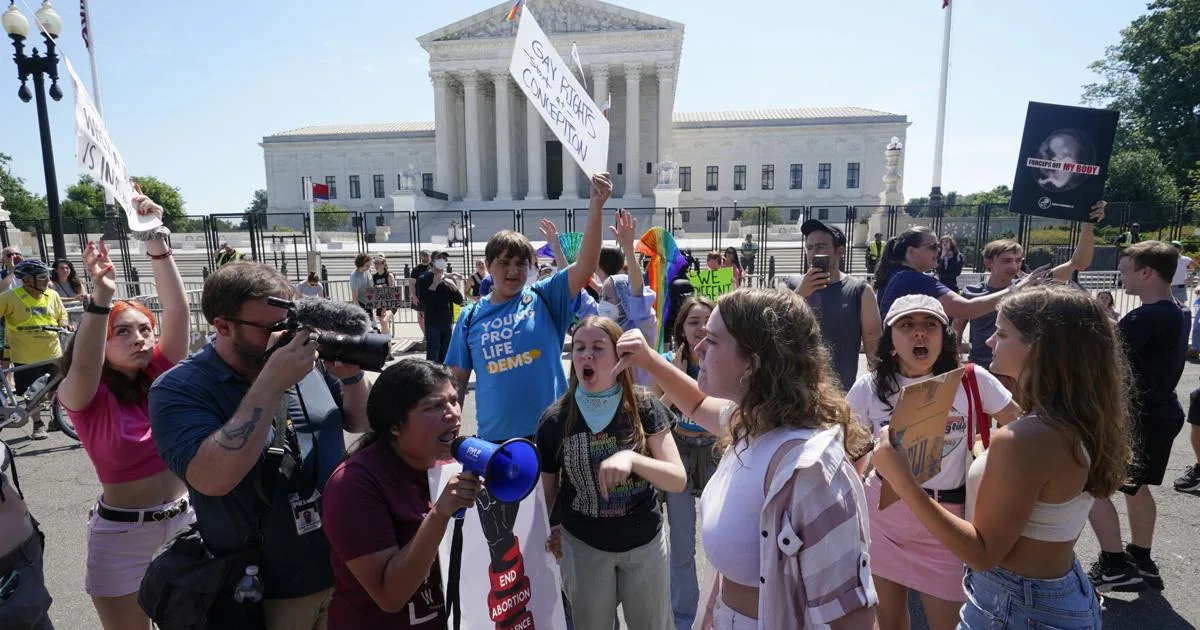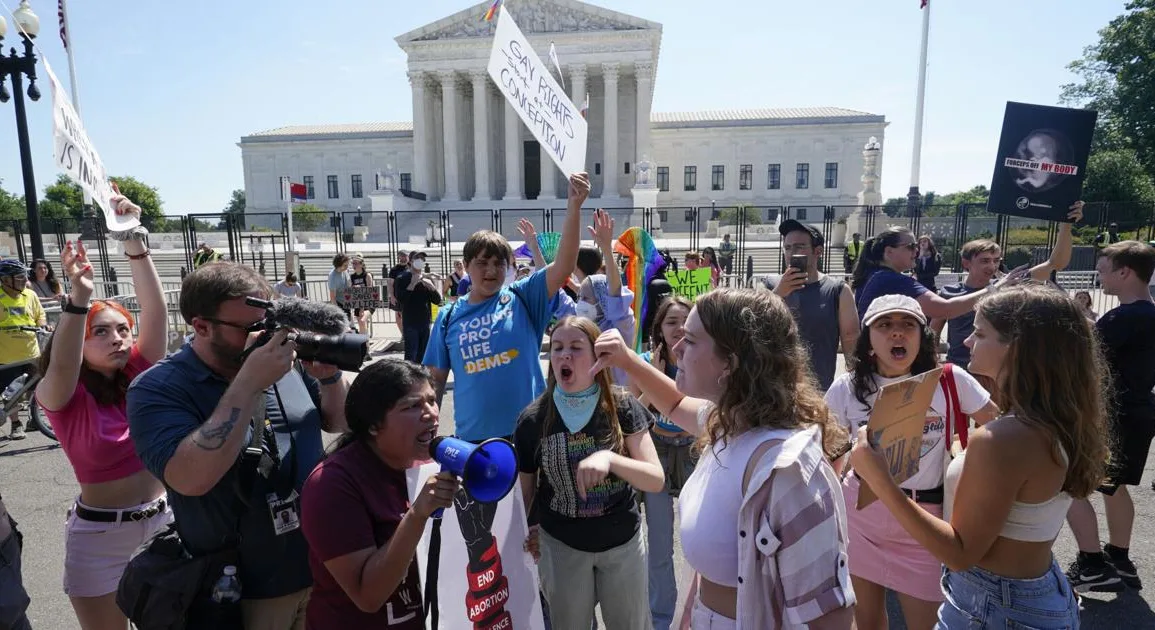
WASHINGTON – All of Louisiana’s announced gubernatorial candidates say they’re “pro-life.” Most say the big questions about the legality of abortion have finally been settled, and therefore won’t play much of a role in this fall’s elections.
While there likely won’t be a robust debate over dismantling Louisiana’s near-total ban on the procedure, there is, however, likely to be passionate discussion of the details.
Candidate Richard Nelson, the Republican state representative from Mandeville, for instance, says he plans to ask his opponents at the next debate just where they stand on the lack of exceptions to the blanket ban on abortion, even when a pregnancy results from rape or incest.
“Hopefully, the moderator will ask. But, if not, I definitely will,” Nelson said Tuesday. “It’s an issue that differentiates my campaign and theirs.”
Democratic candidate Shawn Wilson, of Lafayette, says while abortion is not the leading issue on the campaign trail, it is near the top.
One reason, Wilson surmises, is that because he’s a Democrat and African American, many voters just assume he is pro-abortion. In fact, he is personally “pro-life,” he said, but believes the procedure should be a choice made by the woman and her doctor rather than politicians.
In the year since the U.S. Supreme Court ruled that abortions no longer had national protection, people have begun questioning just what an outright ban actually means, Wilson said. “Women are beginning to see that the trigger laws we have now as extreme, and they often put women in an untenable position,” he said.
Still a top issue
While Louisiana voters are among the most strongly pro-life in the nation, abortion remains the dominant wedge issue in American politics. It promises to be front and center in the 2024’s presidential and congressional elections.
On the national level, Republicans are having to navigate between a base that wants maximum restrictions on the procedure, especially in states where it’s now widely accessible, and more moderate members typically representing suburban areas where voters want fewer restrictions.
For decades, with the right to abortion guaranteed by the U.S. Supreme Court, the two parties were locked in a bitter but mostly academic dispute over the matter. Republicans had a straightforward position against abortion, which they called “pro-life.” National Democrats typically called themselves “pro-choice,” saying they backed a woman’s right to choose what to do with her own body.
After the high court’s Dobbs decision, the details suddenly became much more important, with access to abortion mostly left to the states for now.
In Louisiana, some 60% of voters passed a constitutional amendment banning the procedure in 2020. But candidates for state and congressional seats are now having to grapple with the simultaneous reality that polls show 70% of the state’s voters now back some exceptions, like for rape and incest.
Most candidates are following political strategists’ advice to stick with being against abortion and avoiding the topic of exceptions, which could energize a small group of conservative pro-lifers who vote based on that issue.
“If you have to define your position, you cannot waffle on this issue, that’s more important than the labels,” said John Couvillon, a Baton Rouge political strategist and pollster. “If you favor exceptions, which is an overwhelmingly popular position, then you should go ahead say it, if asked. But be aware that taking that position likely would motivate a vocal section of the electorate.”
Avoiding specifics
The Louisiana congressional delegation seems to have heeded that advice.
When asked directly about rape and incest exceptions, Louisiana’s two senators, both Republicans, and four of the five GOP representatives said they opposed abortion but didn’t address exceptions. (Lafayette Rep. Clay Higgins did not respond. Rep. Troy Carter, the delegation’s only Democrat, said he is “pro-choice.”)
Among gubernatorial candidates, Attorney General Jeff Landry said he supports the Legislature, which in May killed two bills seeking rape and incest exceptions.
Hunter Lundy, who is running without party affiliation, opposes exceptions. State Treasurer John Schroder and former business lobbyist Stephen Waguespack, both Republicans, did not respond to queries, but Waguespack told The Illuminator that he is against exceptions.
Republican Slidell state Sen. Sharon Hewitt, the only woman in the race so far, would say only that the Legislature rejected the exceptions bills.
“I haven’t seen the issue come up on the campaign trail, at least right now,” said Benjamin Clapper, director of Louisiana Right to Life, which opposes exceptions. The lack of chatter is a bit of disappointment for him, he said, because the campaign would allow candidates to better educate the public on what Louisiana’s law does and doesn’t do.
Should Wilson make the runoff against a Republican candidate, Clapper added, abortion could become a major campaign theme.
“It’s definitely going to be an issue,” in both gubernatorial and legislative races, said Michelle Erenberg, executive director of LIFT Louisiana, a New Orleans-based organization that advocates for reproductive rights.
LIFT Louisiana commissioned a poll on how voters viewed the details of the abortion ban
LIFT purposely hired Couvillion, a Republican-leaning strategist, to conduct a poll for them. Released in April, it showed 73% of voters think abortions should be available when a doctor feels it necessary to protect the patient’s health, and 70% support an exception for rape and incest cases. The annual LSU survey showed similar results.
LIFT also polled several legislative districts and found that a majority of constituents who identified as pro-life also supported exceptions, Erenberg said. “Republicans are underestimating the galvanizing impact of the Dobbs decision and the swiftness Louisiana went to a total ban,” she added.
‘It’s not their voters’
For legislators, the issue hasn’t been widely discussed on the campaign trail, said Rep. Rick Edmonds, a Baton Rouge Republican who voted against exceptions in committee.
He says most of the questions he’s received are about adoption and other services. He’s running for state Senate in a Baton Rouge-based district that twice overwhelmingly supported Donald Trump for president.
Many of his constituents never thought they would see an abortion ban in their lifetime, he said, and they are still working through what this new world is like.
“People are still very interested in what happened and how it happened. That’s what most of the questions have been about,” Edmonds said.
In the liberal New Orleans district that Democrat Mandie Landry represents, much of the talk is about Louisiana’s new abortion restrictions. She feels most GOP legislative candidates back exceptions for rape and incest and also a less restrictive framework for doctors. (Currently, doctors can face prison for providing abortions that are not justified under the law.)
“It’s not their voters,” Landry said of Republican legislators’ reluctance to dial the law back. “It’s the interest groups and their money. They’re afraid of getting primaried.”
Nationally, the Dobbs ruling – and various GOP-led states’ moves to restrict the procedure in the months since – have mobilized Democrats who argue that extremists are jeopardizing long-held individual rights.
Republicans so far don’t have a unified position. Their presidential candidates are all over the map, with party members arguing over whether to seek a national ban, and if so, where to draw the line with restrictions.
The shifts come as a June Gallup poll shows that 69% of Americans now believe abortion should be legal in the first three months of pregnancy.
Galvanizing voters
Politically, Democrats’ simpler messaging was at least partially responsible for the outcome of midterm elections, which ended with Democrats picking up a seat in the Senate to retain a majority and Republicans in the U.S. House going from a predicted “red tide” to a razor-thin majority.
The Cook Report, a respected political handicapper, found that attitude shifts among women voters played a key role in the midterms’ outcome. Cook found that Republican candidates who had advocated an “all or nothing” approach, which had served them well in the past, were more vulnerable.
A continued abortion conflict will have consequences at the national level in 2024.
The Democratic majority in the U.S. Senate is vulnerable because the party needs to defend 23 seats, while Republicans have only 10 incumbents up for reelection.
All 435 seats in the U.S. House, in which Republicans hold a 10-seat majority, are up for reelection.
In his February State of the Union address, President Joe Biden put abortion on the table for the 2024 elections. He criticized the states that “are enforcing extreme abortion bans” and promised to veto any national ban that Congress passes.
Lionel Rainey, a Baton Rouge-based Republican strategist who is advising 20 candidates in Louisiana and across the country, said the issue plays differently in different states. Oregon is not Louisiana, and being labelled “pro-life” in that state, regardless of stances on timelines and exceptions, could prove an immediate disqualifier regardless of how voters feel about the candidates’ strengths, he said.
He is recommending that his Oregon clients say “pro-life” is a personal belief while stressing that the Supreme Court has made abortion a state issue that therefore isn’t in their purview.
“We’re advising don’t make abortion a campaign point. Look at jobs, increasing costs in the grocery store and at gas pumps, whatever the pain points are for a particular state, focus on that,” Rainey said. “You need to work the conversation back to inflation and higher costs.”



